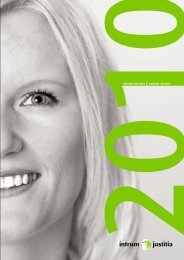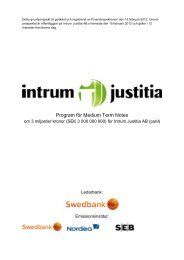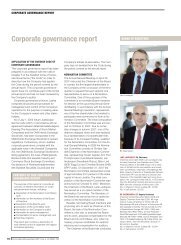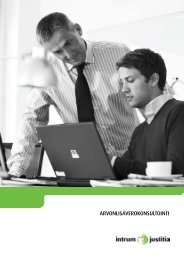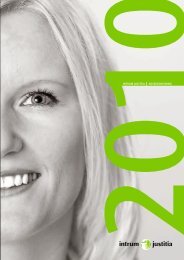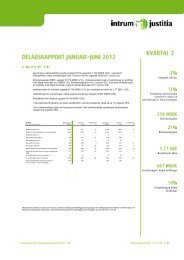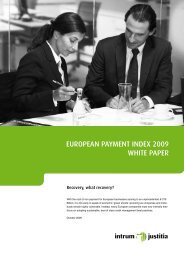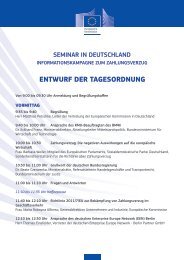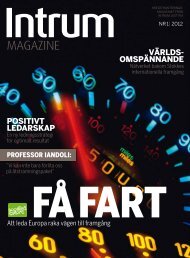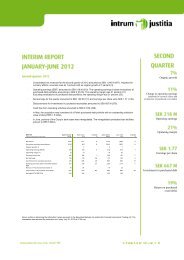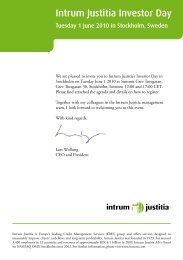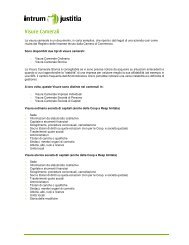Create successful ePaper yourself
Turn your PDF publications into a flip-book with our unique Google optimized e-Paper software.
70<br />
Report on internal control<br />
The Board of Directors’ report on internal control of fi nancial<br />
reporting for the fi scal year 2005<br />
This report has been prepared in accordance with section 3.7.2 of the Swedish<br />
Code of Corporate Governance (“the Code”) and is thereby limited to internal<br />
control of fi nancial reporting. This report does not constitute part of the formal<br />
annual report.<br />
The Board of Directors is ultimately responsible for the Company’s organization<br />
and management of its affairs. Each year in connection with its statutory meeting,<br />
the Board establishes rules of procedure for the Board and an instruction for the<br />
President. These documents cover, among other things, the delegation of duties<br />
between the Board and the President and CEO, as well as how decisions are<br />
made on various issues. The President handles the day-to-day management<br />
according to the Board’s guidelines and instructions.<br />
The basis of internal control of fi nancial reporting is comprised of the control<br />
environment with the organization, decision-making channels, authorization and<br />
responsibilities documented and communicated in governing documents such<br />
as internal policies, guidelines, manuals and codes.<br />
Information and communication of internal policies, guidelines, manuals<br />
and codes for fi nancial reporting are covered in, among other places, the Group’s<br />
Handbook, which is updated regularly. The Handbook is available in electronic<br />
form to all subsidiaries of the Group. The Chief Financial Offi cer, CFO, of the<br />
<strong>Intrum</strong> <strong>Justitia</strong> Group has chief responsibility for the contents of the Handbook.<br />
Consolidated accounts are prepared each month for internal use. Financial<br />
reporting is submitted in the form of both fi gures in a Group-wide reporting<br />
system and written comments according to a special template. Instructions and<br />
rules on written reports and fi gures can be found in <strong>Intrum</strong> <strong>Justitia</strong>’s Handbook.<br />
The results compiled in the monthly accounts are compared with the previous<br />
year, budgeted fi gures and the latest forecast, which is updated quarterly.<br />
Conferences are held once or twice a year for the subsidiaries’ accounting<br />
and fi nancial managers for the purpose of maintaining a high level of quality<br />
in fi nancial reporting by discussing issues concerning the Group’s accounting<br />
principles and examining the requirements on internal control. The conferences<br />
are the responsibility of the Group’s CFO.<br />
<strong>Intrum</strong> <strong>Justitia</strong> applies risk evaluation and risk management to ensure<br />
that the risks the Company is exposed to are managed within established frameworks.<br />
The signifi cant risks monitored include operating and fi nancial risks. To<br />
limit and control risks in subsidiaries’ operations as well as the risk of signifi cant<br />
errors in their fi nancial reporting, the Parent Company performs controls and<br />
follow-ups, for example, through representation on the subsidiaries’ boards,<br />
through visits and follow-ups by business controllers and fi nancial controllers,<br />
and through internal audits.<br />
Stockholm, March 16, 2006<br />
The Board of <strong>Intrum</strong> <strong>Justitia</strong> AB (publ)<br />
Management of fi nancial risks such as interest rate risk, fi nancing risk, liquidity<br />
risk and credit risk is handled by Group Treasury. <strong>Intrum</strong> <strong>Justitia</strong>’s fi nance<br />
policy contains rules on how fi nancial activities are managed, how responsibilities<br />
are delegated, how fi nancial risks are measured and identifi ed, and when<br />
and how they are limited.<br />
<strong>Intrum</strong> <strong>Justitia</strong>’s fi nancial reporting and risk management are also based on a<br />
number of control activities at various levels in companies and business areas.<br />
They are conducted through both IT systems that support various operating<br />
processes and more conventionally designed manual controls to prevent, detect<br />
and correct errors and deviations. Examples of manual controls include authorization<br />
routines and requirements for approval from superiors for verifi cations, as<br />
well as logbooks of transactions and changes in basic data. Emphasis is placed<br />
on the inclusion of only approved business transactions in the fi nancial reporting.<br />
Follow-ups to ensure the quality of internal control are done in various ways<br />
within <strong>Intrum</strong> <strong>Justitia</strong>. Recurring reviews of internal control are made by, among<br />
others, the Internal Audit Function on behalf of and in accordance with the<br />
approach decided on by the Board’s Audit Committee. Since 2003 the internal<br />
audit function is outsourced to an external accounting fi rm.<br />
Internal control is also monitored through board work in subsidiaries; where<br />
action is considered necessary, the controller organization is utilized.<br />
As an element in its audit, the auditor elected by the Annual General Meeting,<br />
KPMG Bohlins AB, also reviews a sample of controls. KPMG Bohlins reports on<br />
its fi ndings and suggests actions to the Board of Directors of <strong>Intrum</strong> <strong>Justitia</strong> AB<br />
twice a year. Prior to these meetings, observations from audits of subsidiaries<br />
have been presented to each local management group. These observations are<br />
acted upon and followed up in a systematic manner within each unit.<br />
In 2003 <strong>Intrum</strong> <strong>Justitia</strong> initiated a special internal control project. Within the<br />
framework of this project, each subsidiary in the Group responded to a questionnaire<br />
on the status of internal control within their company. A similar internal<br />
survey is conducted again in 2006 with a special focus on the companies’<br />
accounting organization. With the survey as a basis, defi ciencies will be identifi ed<br />
and alleviated. At the same time it will identify companies with the highest level of<br />
internal control within each area to facilitate knowledge transfers.<br />
In accordance with the recommendation issued by the Swedish Corporate<br />
Governance Board, the Board refrains from issuing statements on how the<br />
internal control has worked during the year. The report has not been reviewed<br />
by the Company’s auditors.



